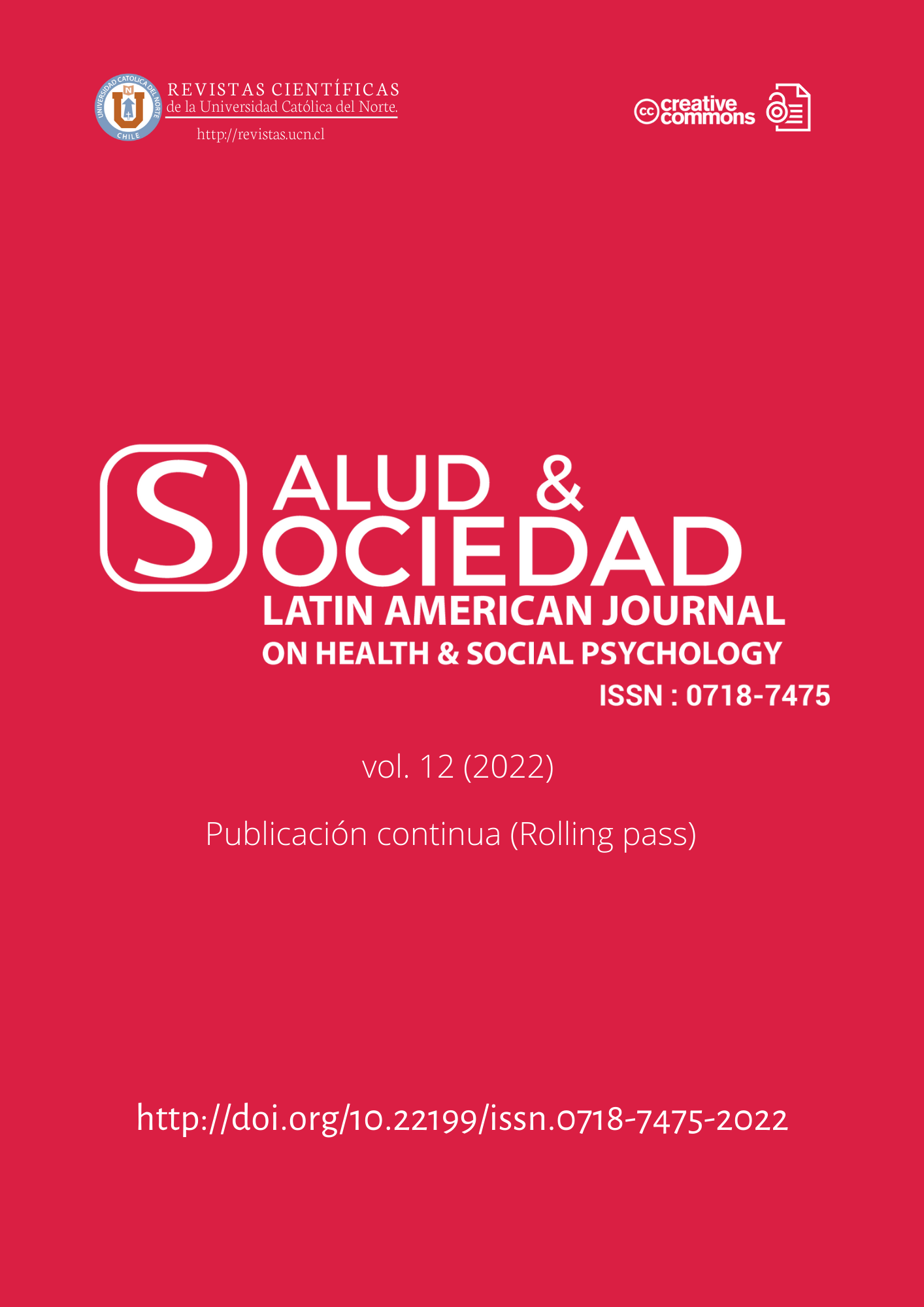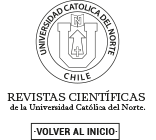The Day After
Collective Behaviors for the Prevention of COVID-19 During the Second Wave
DOI:
https://doi.org/10.22199/issn.0718-7475-5319Keywords:
COVID-19, health behaviors, behavioral impact, resilience, copingAbstract
Background: In Paraguay, the manifestations of the COVID-19 pandemic (WHO, 2020) begin in March (2020) with quarantine and strict biosecurity measures. The 2nd Wave hit the country exceeding 1000 deaths per million. Objective: The study is given continuity in First. Ola (Coppari, 2020) with a second measurement of risk behaviors and protection of groups. Method: The modified "The Day After" Survey (2021) was applied, in a non-experimental, descriptive-exploratory, cross-sectional design, with n= 1292 participants where the majority of respondents were women (68.41%) from 18 to 30 years. Results: The analysis of the total variance is explained in 11 factors, and the reliability coefficient (.84) is adequate. Women have higher averages in resilient and coping behaviors compared to men. Social support-seeking behaviors are higher in religious practitioners versus non-practitioners. There is a high positive correlation between resilient and coping behaviors, and an average positive relationship (.398*) between the mentioned factors and the responsible use of information. Conclusion: The presence of a resilient response by the Paraguayan sample to the situation is concluded, assuming the required biosecurity measures.
Downloads
References
Appelbaum, R. P. & Chambliss, W. J. (1997). Sociology (2nd Ed.). Longman Pub Group.
Bandura, A. (1997). Self-efficacy: The Exercise of Control. New York: W. H Freeman/Times Books/Henry Holt & Company.
Bórquez, B., Luengo, M. X., Anguita M.V., Bascuñán, M. L., Pacheco, I. M., Michaud, P., & Vacarezza, R. (2020). Uso y difusión responsable de la información en pandemia: un imperativo ético. Revista Chilena de Pediatría, 91(5), 794-799. https://doi.org/10.32641/rchped.vi91i5.2420
Calderón, C., Soler, F., Pérez, A. (2020). El Observatorio del Comportamiento de Automedicación de la Universidad del Rosario y su rol en la pandemia de COVID-19. Revista Ciencias de la Salud, 18(2), 1-8. https://bit.ly/3jeIeeJ
Coppari, N., Bagnoli, L., Gonzalez, H., Maidana, P., Ortiz, A., Recalde, J., Süss, G. & Escobar, G. (2020). El Día Después: Comportamientos Colectivos para la Prevención del COVID-19 durante y post-cuarentena. Libro de Memorias del Congreso Virtual de la Sociedad Interamericana de Psicología: Aportes de la Psicología ante la COVID-19 (p.30). Primera edición, San Juan, Puerto Rico © Sociedad Interamericana Psicología y Universidad Carlos Albizu. ISBN: 978-1-7361872-0-3
Echemendía, B. (2011). Definiciones acerca del riesgo y sus implicaciones. Revista Cubana de Higiene y Epidemiología, 49(3), 470-481. https://bit.ly/3jkEV5R
González, J., Soler, Y., Pérez, E., González, R. & Pons, S. V. (2021). Percepción de riesgo ante la COVID-19 en pobladores del municipio Manzanillo. Multimed, 25(1), e2015. https://bit.ly/3VfrktF
Grotberg, E. (1997). La resiliencia en acción. Seminario Internacional sobre Aplicación del Concepto de Resiliencia en Proyectos Sociales. Universidad Nacional de Lanús, Fundación Van Leer.
Gutiérrez, L., Coba, P. & Gómez, J. A. (2020). Las noticias falsas y desinformación sobre el COVID-19: análisis comparativo de seis países iberoamericanos. Revista Latina de Comunicación Social, 78, 237-264. https://doi.org/10.4185/RLCS-2020-1476
Gutiérrez H., M., Fanjul, L. F., Díaz, A., Reyes, P., Herrera, J. F., Enjuto, M. & Sho, T. (2021). COVID-19 lockdown and mental health in a sample population in Spain: the role of self-compassion. International Journal of Environmental Research and Public Health, 18(4), 2103. https://doi.org/10.3390/ijerph18042103
Kerby, D. S. (2014). The simple difference formula: An approach to teaching nonparametric correlation. Comprehensive Psychology, 3, 2165–2228.
Lazarus, R. S. y Folkman, S. (1986). Estrés y Procesos Cognitivos.
Martínez-Roca. Legler, T. (2021). Presidentes y orquestadores: la gobernanza de la pandemia de COVID-19 en las Américas. Foro internacional, 61(2), 333-385. https://doi.org/10.24201/fi.v61i2.2833
Luthard, S. S., & Cicchetti, D. (2000). The construct of resilience: Implications for interventions and social policies. Developmental and Psychopathology, 12, 857-885. https://doi.org/10.1017/s0954579400004156
Ministerio de Salud Pública y Bienestar Social (2021). Paraguay Registra la Segunda Ola de Casos de COVID-19. MSPBS. https://bit.ly/3v3byrn
Navarrete, P., Velasco, J. & Loro, L. (2021). Automedicación en época de pandemia: COVID-19. Revista Del Cuerpo Médico Hospital Nacional Almanzor Aguinaga Asenjo, 13(4), 350-355. https://doi.org/10.35434/rcmhnaaa.2020.134.762
Oblitas, L. A. (2008). El estado del arte de la Psicología de la Salud. Revista de Psicología, 26(2), 219-254. https://bit.ly/3PLFeTu
OMS (2010). ¿Qué es una pandemia? https://bit.ly/2vmmr8Q
Palomino, M., Lovón, M. & Arellanos, R. (2020). La red sanitaria y su participación en la difusión o contención de las fake news y bulos relacionados con la COVID-19: el caso de Lima-Perú. Chasqui. Revista Latinoamericana de Comunicación, 1(145), 93-118. https://doi.org/10.16921/chasqui.v1i145.4332
Park, N., Peterson, C. & Sun, J. (2013). La Psicología Positiva: Investigación y aplicaciones. Terapia Psicológica, 31. 11-19.
https://doi.org/10.4067/S0718-48082013000100002
Pelechano, V. (1992) Personalidad y estrategias de afrontamiento en pacientes crónicos (1) (2). Análisis y Modificación de Conducta, 18(58), p. 167-201. https://bit.ly/3jgdEkW
Pérez, J., Dorado, A., Rodríguez-Brioso, M. & López, J. (2020). Resiliencia para la promoción de la salud en la crisis COVID-19 en España. Revista de Ciencias Sociales, XXVI(4), 52-63. https://bit.ly/3v7HJ8R
Ramírez Chinchilla, K. (2020) Investigación de la UNED analiza conductas y percepciones de los costarricenses frente al COVID-19. Acontecer Digital. https://bit.ly/3YDHm3u
Ramírez, J., Castro, D. Lerma, C. Yela, F. & Escobar, F. (2020). Mental health consequences of the COVID-19 pandemic associated with social isolation. Colombian Journal of Anesthesiology, 48(4), e930. https://doi.org/10.5554/22562087.e930
Rodríguez Piaggio, A. M., (2009). Resiliencia. Revista Psicopedagogía, 26(80), 291-302. https://bit.ly/3YGJ6ZE
Rodríguez, J. & Ruiz, P. (2020) Recuperando la Esperanza. Salud Mental en Guatemala. Experiencias 1997 - 2001. Editado por la OPS/OMS. Guatemala. https://bit.ly/3BRZq04
Rutter, M. & Rutter, M. (1992). Developing Minds: Challenge and Continuity across the Life Span. Londres: Penguin Books
R Core Team (2021). R: A Language and environment for statistical computing. (Version 4.0) [Computer software]. Retrieved from https://bit.ly/3BSR4W5. (R packages retrieved from MRAN snapshot 2021-04-01).
San Román, S., Martínez, A., Zurita, F., Chacón, R., Puertas, P. & González, G. (2019). Capacidad de resiliencia según tendencia religiosa y género en universitarios. Revista Electrónica de Investigación Educativa, 21(1), e15. https://doi.org/10.24320/redie.2019.21.e15.2016
Seligman, M. P., & Csikszentmihalyi, M. (2000). Positive psychology: An introduction. American Psychologist, 55, 5-14. https://doi.org/10.1037/0003-066X.55.1.5
Stuenkel, O. (2020). The Peril of a Rudderless Continent. Americas Quarterly. https://bit.ly/3HQuDo8
Ríos Sierra, J. (2020a). La inexistente respuesta regional a la COVID-19 en América Latina. Geopolítica(s). Revista de Estudios Sobre Espacio y Poder, 11(Especial), 209-222. https://dx.doi.org/10.5209/geop.69324
Ríos Sierra, J. (2020b). Una aproximación (Geo) Politológica a la crisis de la COVID-19 en América Latina. Journal of Latin American Geography 19(3), 194-201. http://doi.org/10.1353/lag.2020.0079
Suárez Ojeda, E. N. (2004) Perfiles de resiliencia. En E.N. Suarez Ojeda y M.A. Munist M, Kotliarenco (Eds). Resiliencia: Tendencias y Perspectivas. Ediciones de la UNLA.
Tarazona, A. (2020). Relaciones en tiempos de pandemia: COVID-19 y bienestar animal, ambiental y humano. Revista Facultad Nacional de Agronomía Medellín. https://doi.org/10.15446/rfnam.v73n2.86957
The Jamovi Project (2021). Jamovi. (Version 2.2) [Computer Software]. Retrieved from https://bit.ly/3hEPBM0
Zanon, C., Dellazzana, L., Wechsler, S., Fabretti, R., & Rocha, K. (2020). COVID-19: implicações e aplicações da psicologia positiva em tempos de pandemia. Estudos de Psicologia (Campinas).
Downloads
Published
Issue
Section
License
Copyright (c) 2022 Norma B. Coppari, Hugo Arsenio González, Ariel Matías Joaquín Ortiz Martinez, Jesús Recalde, María Guadalupe González Vallejos, Samira Elias, Sofía Rolón Moreno, Ana Mikelj, Fernanda Ibarra, Alejandra Izzi, Jennifer Wiebe, Estela González Solis

This work is licensed under a Creative Commons Attribution 4.0 International License.
Los autores continúan como propietarios de sus trabajos, y pueden volver a publicar sus artículos en otro medio sin tener que solicitar autorización, siempre y cuando indiquen que el trabajo fue publicado originariamente en Revista Salud & Sociedad (ISSNe:0718-7475).



_(1).png)





